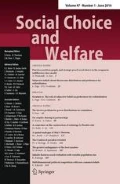Abstract
We consider a society whose members have to choose not only an outcome from a given set of outcomes but also the subset of agents that will remain members of the society. We assume that each agent is indifferent between any two alternatives (pairs of final societies and outcomes) provided that the agent does not belong to any of the two final societies, regardless of the chosen outcome. Under this preference domain restriction we characterize the class of all strategy-proof, unanimous and outsider independent rules as the family of all serial dictator rules.
Similar content being viewed by others
Notes
All these examples will be included as particular instances of our model. However, the strong incentive requirement of strategy-proofness will be incompatible with any stability notion related to voluntary membership.
See the last section of the paper for a discussion about the consequences of requiring stronger domain restrictions.
For instance, complex and sequential algorithms defined for matching problems induce rules mapping preference profiles into alternatives.
Note that we are admitting the possibility that the society selects all outcomes with no agent in the final society; i.e., for all \(x\in X\) , \((\varnothing ,x)\in A\).
See the final section of the paper for an indication of the class of strategy-proof and unanimous rules that are not outsider independent.
Observe again that the preferences we are considering satisfy (P.1) and hence, rules do not operate on the universal domain of preferences over A. Thus, the Gibbard–Satterthwaite theorem can not be applied.
The preference \(R_{N^{*},\succ _{i}}\) may not depend on \(\succ _{i},\) but for simplicity we maintain the notation \(R_{N^{*},\succ _{i}}\) .
We thank a referee of this journal for suggesting us these two domain restrictions. However, to obtain full characterizations of interesting classes of non-trivial and strategy-proof rules, on the two corresponding domains, seems to require a complete analysis, which is outside the scope of the present paper.
References
Bade S (2015) Serial dictatorship: the unique optimal allocation rule when information is endogenous. Theor Econ 10:385–410
Barberà S, Sonnenschein H, Zhou L (1991) Voting by committees. Econometrica 59:595–609
Barberà S, Maschler M, Shalev J (2001) Voting for voters: a model of electoral evolution. Games Econ Behav 37:40–78
Berga D, Bergantiños G, Massó J, Neme A (2004) Stability and voting by committees with exit. Soc Choice Welf 23:229–247
Berga D, Bergantiños G, Massó J, Neme A (2006) On exiting after voting. Int J Game Theory 34:33–54
Berga D, Bergantiños G, Massó J, Neme A (2007) An undominated Nash equilibrium for voting by committees with exit. Math Soc Sci 54:152–175
Bergantiños G, Massó J, Neme A (2016) On societies choosing social outcomes, and their memberships: internal stability and consistency. Mimeo, New York
Deb R, Razzolini L (1999) Auction-like mechanisms for pricing excludable public goods. J Econ Theory 88:340–368
Demange G, Wooders M (eds) (2005) Group formation in economics: networks, clubs, and coalitions. Cambridge University Press, New York
Gibbard A (1973) Manipulation of voting schemes: a general result. Econometrica 41:587–601
Jackson M, Nicolò A (2004) The strategy-proof provision of public goods under congestion and crowding preferences. J Econ Theory 115:278–308
Papai S (2001) Strategy-proofness and nonbossy multiple assignments. J Public Econ Theory 3:257–271
Roberts K (1999) Dynamic voting in clubs. Mimeo, London School of Economics, London
Satterthwaite M (1975) Strategy-proofness and Arrow’s conditions: existence and correspondence theorems for voting procedures and social welfare functions. J Econ Theory 10:187–217
Satterthwaite M, Sonnenschein H (1981) Strategy-proof allocation mechanisms at differentiable points. Rev Econ Stud 48:587–597
Svensson L-G (1999) Strategy-proof allocation of indivisible goods. Soc Choice Welf 16:557–567
Thomson W (2016) Non-bossiness. Soc Choice Welf 47:665–696
Author information
Authors and Affiliations
Corresponding author
Additional information
We are grateful to two referees and an Associate Editor of this journal for very useful comments and suggestions that helped us to write a better version of the paper. The work of G. Bergantiños is partially supported by research Grants ECO2014-52616-R from the Spanish Ministry of Science and Competitiveness, GRC 2015/014 from “Xunta de Galicia”, and 19320/PI/14 from “ Fundaci ón Séneca de la Región de Murcia”. J. Massó acknowledges financial support from the Spanish Ministry of Economy and Competitiveness, through the Severo Ochoa Programme for Centres of Excellence in R&D (SEV-2015-0563) and Grant ECO2014-53051, and from the Generalitat de Catalunya, through Grant SGR2014-515. The paper was partly written while J. Massó was visiting the Department of Economics at Stanford University; he wishes to acknowledge its hospitality as well as financial support from the Ministerio de Educación, Cultura y Deporte through project PR2015-00408. The work of A. Neme is partially supported by the Universidad Nacional de San Luis, through Grant 319502, and by the Consejo Nacional de Investigaciones Científicas y Técnicas (CONICET), through Grant PIP 112-200801-00655.
Rights and permissions
About this article
Cite this article
Bergantiños, G., Massó, J. & Neme, A. On societies choosing social outcomes, and their memberships: strategy-proofness. Soc Choice Welf 48, 857–875 (2017). https://doi.org/10.1007/s00355-017-1041-0
Received:
Accepted:
Published:
Issue Date:
DOI: https://doi.org/10.1007/s00355-017-1041-0



